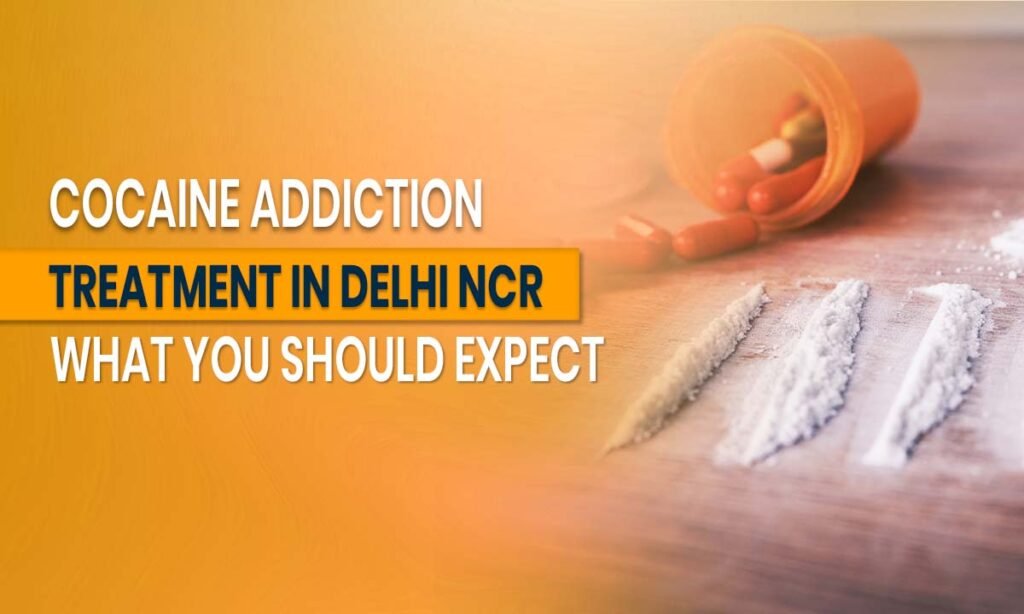
Cocaine addiction is one of the most dangerous and life-altering diseases affecting millions of people around the world. Cocaine, a highly addictive drug, falls under the category of stimulants that influence the central nervous system, resulting in significant euphoria and energy surges. However, its effects in the long run are catastrophic, both physically and psychologically.
Early detection, therefore, becomes possible with critical knowledge about the symptoms of cocaine addiction and related aspects. The post talks about the crucial signs of cocaine addiction, withdrawal symptoms, the interaction between cocaine and alcohol addiction, and available treatment options, particularly in the Delhi NCR region. There are some excellent options available, such as Athena Luxus.
Cocaine Addiction: Overview
The coca plant yields cocaine, and its addictive nature stems from its ability to stimulate the brain’s reward system by elevating dopamine levels. Initially, it feels exhilarating, but long-term usage leads to dependency and tolerance, where the user needs higher doses to experience the same high. The cycle of using over time leads to addiction, in which the person loses control over their use despite adverse consequences.
Cocaine addiction often starts innocently because people try it as a recreational drug at parties or social events. Unfortunately, its addictive property quickly traps them, and they cannot function anymore without it. Early recognition of this addiction is of utmost importance in preventing long-term damage.
Cocaine Addiction Symptoms
The detection of symptoms of cocaine addiction may prove challenging, especially at an early stage. However, some behavioral, physical, and psychological signs characterize dependency.
Behavioral Symptoms
Compulsive Cocaine Use:The drug abuser has a compulsion to obtain and use the drug, sometimes at the cost of losing jobs, homes, or school.
Financial Troubles:The high cost of cocaine often leads users to deplete all their available funds or resort to borrowing money to sustain their use.
Social Withdrawal:Cocaine users often isolate themselves from family and friends, adopting a secretive lifestyle to conceal their cocaine use.
Physical Symptoms
Dilated Pupils and Hyperactivity:Cocaine excites the central nervous system, which leads to very apparent physiological symptoms like dilated pupils, restlessness, and hyper energy.
Weight Loss:Chronic cocaine use suppresses the appetite, leading to severe weight loss over time.
Nasal Damage:Snorting cocaine repeatedly leads to nasal damage, nosebleeds, runny noses, or even a collapsed septum.
Psychological Symptoms
Mood Swings:Users are prone to very extreme euphoric and irritative cycles.
Paranoia and Anxiety:Chronic usage leads to greater paranoia and anxiety accompanied by hallucination.
Depression:Following the effects of cocaine, the abuser often experiences depressive states, characterized by overwhelming feelings of wretchedness and hopelessness.
Cocaine Addiction Withdrawal Symptoms
When a cocaine addict tries to quit, withdrawal symptoms appear, which, both physically and psychologically, are exhausting. These symptoms occur because the brain cannot function without the drug.
Common Symptoms of Withdrawal
Fatigue and Lethargy:Users experience extreme fatigue as a result of the drug’s stimulant effects on the body.
Cravings:A severe urge for the drug will not help anyone live clean unless they receive professional assistance.
Depression with Suicidal Thoughts:The loss of the ‘high’ can lead to acute depression.
Increased Appetite:Generally, withdrawal leads to massive increases in appetite.
Sleep Disorders:Insomnia or hypersomnia are common as the body’s natural rhythms strive to return to normal. Professional attention is required in handling withdrawal symptoms, as quitting cocaine can rather than the decreases observed in active cocaine.be highly stressful both physically and psychologically.
The Interrelationship Between Cocaine and Alcohol Addiction
People commonly use cocaine and alcohol together, but this combination poses a significant risk as it increases the likelihood of addiction and serious health problems. When these substances are consumed in combination, the body produces cocaethylene, which has a cumulative effect on both substances, maximizing euphoria and improving toxic levels, thereby burdening the liver and the cardiovascular system more heavily.
Why Do People Mix Cocaine and Alcohol?
It will decrease the depressant effect of alcohol but raise the stimulation that goes along with cocaine for a great party. A user will experience an intensified high, leading to increased addiction.
Risks Involved with Cocaine and Alcohol
When taking alcohol and cocaine at the same time, one is at risk of overdose because cocaethylene stays in the body for a longer time.
Cardiovascular Stress:It can cause heart attacks, arrhythmias, or strokes.
Behavioral Risks:This combination leads to an inability to make rational judgments, which typically results in unsafe sexual practices or violence.
Cocaine as an Addictive Drug
Cocaine causes addiction because it disrupts the reward system of the brain. Each time that an individual uses cocaine, dopamine flows into the brain to produce pleasure and energy. Later on, the brain adjusts to its normal level of dopamine, meaning that one requires more cocaine for that feeling to develop. Without this type of intervention, quitting becomes extremely difficult.
Social Effects of Cocaine Addiction
In addition to the individual health effects, cocaine addiction has social effects. Families are usually broken because of the financial burden, mistrust, and emotional disturbance that result from addiction. Additionally, individuals may lose their jobs, get into legal troubles, or become socially isolated because of their behavior.
Signs of Cocaine Addiction in Loved Ones
It is not easy to identify cocaine addiction in loved ones, and it is very important for early intervention. Some common warning signs are:
Apparent Changes:Some obvious warning signs include rapid weight loss, frequent bloody nose, and dilated eyes.
Psychotic Behavior:It may be cocaine-related when sudden mood swings, paranoia, or hyperactivity occurs.
Abandonment of Responsibilities:Skipping work, missing school, failing to meet deadlines, and abandoning family can raise suspicions.
Paraphernalia:Small pieces of plastic bags, razor blades, or rolled-up money are some of the most prevalent things used.
Treatment for Cocaine Abuse
Cocaine addiction must be handled holistically. This is simply because there are so many aspects to this condition—physical, psychological, and social. Luckily, many effective treatment programs exist for cocaine abuse.
Detoxification:
Detoxification is recovery’s first step; that is, the body is fully cleansed of all traces of cocaine. This should be undergone under medical supervision to manage the withdrawal symptoms.
Behavioral Therapy
CBT:CBT helps enable the individual to identify and change unwanted thought patterns that may be leading to drug use.
Motivational Interviewing:This intervention helps the individual develop internal reasons to quit cocaine.
MAT: There is no specific FDA-approved medication for cocaine addiction. However, some drugs, such as disulfiram or modafinil, may be used to control withdrawal symptoms and reduce cravings.
Support Groups: Joining support groups like Narcotics Anonymous (NA) provides a peer community that understands the struggles of an individual and can provide emotional support.
Cocaine Addiction Treatment Centers in Delhi NCR
There are many well-known cocaine addiction treatment centers in the Delhi NCR region, which offer full-fledged care for those looking to get over substance dependency. The treatment centers emphasize a holistic approach to recovery, incorporating medical intervention, counseling, and rehabilitation programs according to the needs of the individual.
Specialized Programs:Treatment centers in Delhi NCR provide special programs, which include both outpatient and inpatient services. Inpatient services help a patient to be structured, with the ability to focus completely on recovery, while outpatient services help individuals maintain their daily routine and attend therapy sessions.
Detoxification Services: One of the first types of recovery services, detox centers are medically supervised for detoxifying the patient from the substance. It withdraws cocaine from the body under medication that helps the patient deal with withdrawal symptoms.
Therapeutic Support:Some centers offer the expertise of experienced therapists trained to handle disorders arising due to substance abuse. Cognitive-behavioral therapy, group therapy, and counseling are common service types.
Family Counseling:These centers understand that addiction affects the family. Therefore, they ensure that there are family counseling sessions where the loved ones are enlightened on the nature of the addiction and how they may assist in recovery.
Aftercare Programs:Aftercare is also essential, as most of the centers also offer aftercare services through workshops on relapse prevention, alumni programs, and further therapy sessions.
Selecting the Treatment Center Proper selection of a treatment center is one of the vital decisions while recovering from cocaine. The following points need to be considered for the selection of such a place:
Accreditation and Licensing:Such a place must be accredited by health care bodies as well as hire licensed professionals.
Specialization:Look for places especially designed for cocaine addiction treatment, as these will be enabled to treat the peculiar problems arising due to cocaine addiction.
Treatment Methodologies:Evaluate the treatment methodologies they use in the center. Holistic approaches that include medical, psychological, and social support usually work better.
Location and Accessibility:Some people prefer having centers close to home for convenience. Others may find a quieter, more private location appealing.
Cost and Insurance Coverage: The cost of treatment can vary significantly. Ensure that the center accepts your insurance or has a payment plan if needed.
Patient Reviews and Success Rates:Research patient reviews and the success rates of the center to gauge the quality of care provided.
Supportive Environment:A treatment center that is empathetic and caring in nature can make all the difference in the recovery process.
Long-Term Recovery and Relapse Prevention
Recovery from cocaine addiction is a lifetime process, which requires hard work and support. Some of the most crucial strategies that can help someone to stay sober include:
Support System:Friends and family members can be great motivators and encouragers.
Avoiding Triggers:One has to learn how to recognize and avoid situations or environments that would lead them to relapse.
Healthy Lifestyle Choices:Regular exercise, maintaining a balanced diet, and mindfulness improve one’s overall well-being.
Maintenance of Therapy:It is the treatment sessions wherein lies a good opportunity for handling the patient’s underlying issues while helping the patient develop healthy coping mechanisms.
Importance of Early Detection
Early detection of signs of cocaine addiction is very important as it prevents the condition from worsening to a point where irreversible damage occurs. Family members, friends, and colleagues play an important role in identifying the problem, providing support, and encouraging the person to seek professional help.
Conclusion
Cocaine addiction is a disease that affects the individual suffering from it but also causes a ripple effect on loved ones. Early identification of symptoms and seeking help can increase chances of recovery. It could be knowledge of withdrawal symptoms, risks associated with combining cocaine with alcohol, or what type of treatment is available. For those in Delhi NCR, specialized treatment centers like Athena Luxus are there to help individuals struggling with cocaine addiction and provide support and resources to reclaim life.
Frequently Asked Questions
What are the early signs of cocaine addiction?
Early signs include mood swings, compulsive use, financial troubles, weight loss, dilated pupils, and social withdrawal. Recognizing these symptoms early can prevent severe consequences.
Why is cocaine highly addictive?
Cocaine disrupts the brain’s reward system, causing intense pleasure. Over time, the brain needs more cocaine to feel the same high, leading to dependency.
What are the withdrawal symptoms of cocaine addiction?
Common symptoms include fatigue, depression, cravings, sleep issues, and increased appetite. Professional help is essential for managing these symptoms.
How does mixing cocaine and alcohol increase risks?
Combining cocaine and alcohol creates cocaethylene, intensifying euphoria but raising the risk of overdose, heart issues, and poor judgment.
What treatments are available for cocaine addiction?
Treatments include detox, cognitive-behavioral therapy (CBT), motivational interviewing, support groups, and aftercare programs. Centers in Delhi NCR, like Athena Luxus, provide holistic recovery plans.

